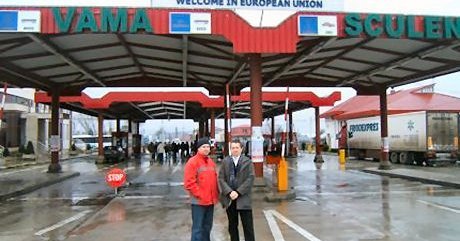The 8 Member States who had to eliminate their restrictions expressed, in more or less equivocal terms, their fears that the coming migrants will be more interested in their social-benefits system than in finding an honest job.
As a Romanian living abroad, I feel that this debate has been skewed and used for the political gain of some. This new migrant scare was launched with minimal reference to facts and intended to act as a counterweight against the rise of far-right parties across the continent. Mainstream parties, in an effort to stop the haemorrhaging of their votes, have begun addressing themes traditionally outside of their ideological vocabulary.
The first consequence of this move has been that, by matching the rhetoric of extremist parties, mainstream parties have contributed to their visibility and have legitimized xenophobic messages. In addition, by tapping into the general anti-European mood of the electorate, traditional parties have managed to shift the blame to the unelected, faceless bureaucracy that resides in Brussels. The European Commission is hence accused of forcing them to open their borders.
The other side of the coin
I must confess that, despite its failings, I still believe in the future of a Federal Europe. All too often has the Union been unjustly blamed by national leaders who have used Brussels as a convenient scapegoat in order to justify the adoption of unpopular, yet necessary, reforms. The free movement of workers is no exception and I find it unfortunate that such a fundamental freedom has been so harshly contested. Facts clearly show that intra-EU migration has led to faster economic growth and has even helped balance social security schemes, following the Eastern enlargements of 2004/2007. For instance, the GDP of the EU15 is estimated to have risen by 1% between 2004-2009 thanks to post-enlargement mobility. By the end of 2012, 14.1 million individuals have chosen to settle in a different European state than the one they were born in.
If so many Europeans have chosen to take advantage of their new movement rights it is because this policy is at the very centre of the EU’s founding principles. The jurisprudence of the European Court of Justice has carved the principle of non-discrimination for all freedom of movements, put in place by the Treaty of Rome, in stone. It means that migrants are entitled to the same rights as the nationals of the host country when it comes to access to the labour market and social benefits. Helped by this legal principle, citizens have freely moved throughout Europe, finding jobs or starting families. That’s why, when asked what they like best about the Union, most people answer “the free movement of workers”.
In a recent communication, the European Commission has pointed out that not only do migrants tend to have higher employment rates than nationals of host countries, but that they are net contributors to these countries’ benefits schemes. Migrants are unlikely to be taking advantage of the welfare state, no matter what certain politicians might claim. In Germany, Sweden, and the Netherlands, for example, they receive less than 5% of the social funds potentially available to them.
Step up or step aside
One of the more vocal adversaries of the free movement of workers has been the UK, over fears of the destabilizing effect they will have on the national welfare system. According to the stats, though, migrants account for less than 1% of total spending on social benefits and health care.
Another important aspect is that, in order to be eligible for social assistance, migrant EU citizens must possess a legal right of residence in the host country, which usually entails having a job and paying taxes. Only after five years of legal residence are they entitled to social assistance under the same rules as nationals of the host Member State.
An oft-repeated saying is “They [migrants] took our jobs”. Again, the data rather shows we see that this crowding out phenomenon is happening mostly with jobs commonly held by migrants, and not by nationals of the host country. We should not forget that the stereotypical job the Polish were supposed to have been ‘stealing’ was the glitzy career of a plumber.
In a recent article on Bulgaria and Romania, The Economist makes a very good point, asking readers "Why leave in a recovery?” It mentions that Romania’s unemployment rate has been steadily declining, this year slipping below the 5% mark. Moreover, the economy has been growing at a more-than-impressive rate, achieving 4.1% in the last quarter alone. This hasn’t been the case in the past years, hence the three million Romanians that have already left the country, heading mostly to Italy and Spain to do odd jobs.
How many more that have not already left will make this decision now? The first weeks have shown us that few will. The brain drain has run its course and, as things start to pick up, the decision to head to the West will be harder and harder to take. These are hard facts to swallow for many European leaders. Through their aggressive rhetoric they have done more harm than good, pushing away talent and breeding nationalism and xenophobia. An old saying goes along the lines of “step up to the challenge or step aside”. It’s high time for some politicians to make this choice.

Follow the comments: |
|
